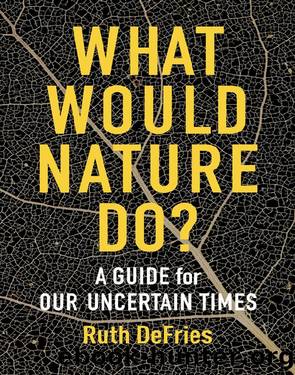What Would Nature Do?: A Guide for Our Uncertain Times by DeFries Ruth

Author:DeFries, Ruth
Language: eng
Format: epub
Tags: NAT010000, Nature/Ecology, SCI092000, Science/Global Warming & Climate Change
Publisher: Columbia University Press
Published: 2020-01-12T00:00:00+00:00
Despite what one might think of power grabbing and greed enabled by raw capitalism, Adam Smith saw the utility of a system driven by bottom-up, self-organizing individual decisions. His infamous âinvisible handâ echoes evolutionâs insight that a central authority cannot replace local information perceived by individuals in the closest position to have accurate intelligence. Like shimmering fish schools, V-shaped formations, termite castles, and single-file ant marches that emerge unplanned from individuals following simple rules, economies grow from individual capitalists seeking profits for themselves. An individual âneither intends to promote the public interest, nor knows how much he is promoting it ⦠he intends only his own gain, and he is in this, as in many other cases, led by an invisible hand to promote an end which was no part of his intention ⦠By pursuing his own interest he frequently promotes that of the society more effectually than when he really intends to promote it.â Adam Smithâs âendâ is not protection against predators or a royal chamber for a queen termite, rather it is the âdistribution of the necessaries of life.â Shopkeepers adjust their wares to what people buy. No central authority pre-plans how much flour, salt, or milk each shopkeeper should stock. The system runs itself.
One can question whether unfettered capitalism results in the most desirable distribution of basic necessities to the worldâs population. But indeed, the truth of Adam Smithâs marketplaceâand evolutionâs experience that bottom-up self-organization wins out over top-down command and controlâhas proven itself out over time as centrally planned economies mire in outdated technologies, waste, and inefficiencies.
Comparisons of ant colonies, flocks of geese, termite societies, and zebra stripes with capitalist economies and the communities of Torbël herders, Alanya fishers, and Nepali farmers cannot go too far. People do not follow instincts like pheromone-following ants or wing-flapping Canada Geese. Human-made rules and norms take the place of instincts in other species. Rules and norms are more fluid than genetically programmed rule-following behavior. Human societies devise their own rules about who can use how much of which resource. Every rule, regulation, law, or policy is an experiment in humanityâs task to collectively organize ourselves.
Natureâs rules provide a guide for civilizationâs experiments. Decentralized rules tailored to the ecology and culture of the place, developed and enforced by the users, tested over time, adaptable to changing conditions, and locally perceived as beneficial rather than punitive are more likely to endure than top-down directives. One-size-fits-all rules and scalable blueprints are less likely to ward off free riders and avoid tragedies. Top-down directives enable clockwork solutions. A central authority can deploy sensors in homes to cut down energy use, for example, or install detectors to keep people from speeding. In complex systems of interacting parts where the resource and the user continually change and adapt to each other, Ostromâs observations of successful self-organized communities ring true with natureâs experience.
Ostrom studied small, mostly self-contained communities of fishers, herders, farmers, and forest-dwellers where local people could confront free riders in the coffeehouse. In
Download
This site does not store any files on its server. We only index and link to content provided by other sites. Please contact the content providers to delete copyright contents if any and email us, we'll remove relevant links or contents immediately.
Time Management Made Easy: How to Cultivate New Habits, Improve Productivity and Get Things Done by Joshua Strachan(2419)
The 7 Habits of Highly Effective People by Stephen R. Covey & Sean Covey(2269)
The Concise Laws of Human Nature by Robert Greene(1917)
Doesn't Hurt to Ask by Trey Gowdy(1641)
Primal Leadership by Daniel Goleman(1286)
Hook Point: How to Stand Out in a 3-Second World by Brendan Kane(1250)
Don't Sweat the Small Stuff...and It's All Small Stuff by Richard Carlson(1123)
The Power of 100! by Shaun King(1100)
HBR's 10 Must Reads 2021 by unknow(1099)
Amazon Unbound by Brad Stone(1047)
100 Things Successful People Do by Nigel Cumberland(1031)
Master of One by Jordan Raynor(1008)
HBR's 10 Must Reads 2021 by Harvard Business Review(1008)
The Job Closer by Steve Dalton(996)
Lives of the Stoics by Ryan Holiday & Stephen Hanselman(970)
Declutter Your Mind: A step by step guide to learn to control your thoughts, stop worrying, relieve anxiety and eliminate panic attacks and negative thinking by Mia Chandler(970)
Conflicted by Ian Leslie(873)
The Book of Hope by Jane Goodall(873)
Coders at Work: Reflections on the craft of programming by Peter Seibel(848)
